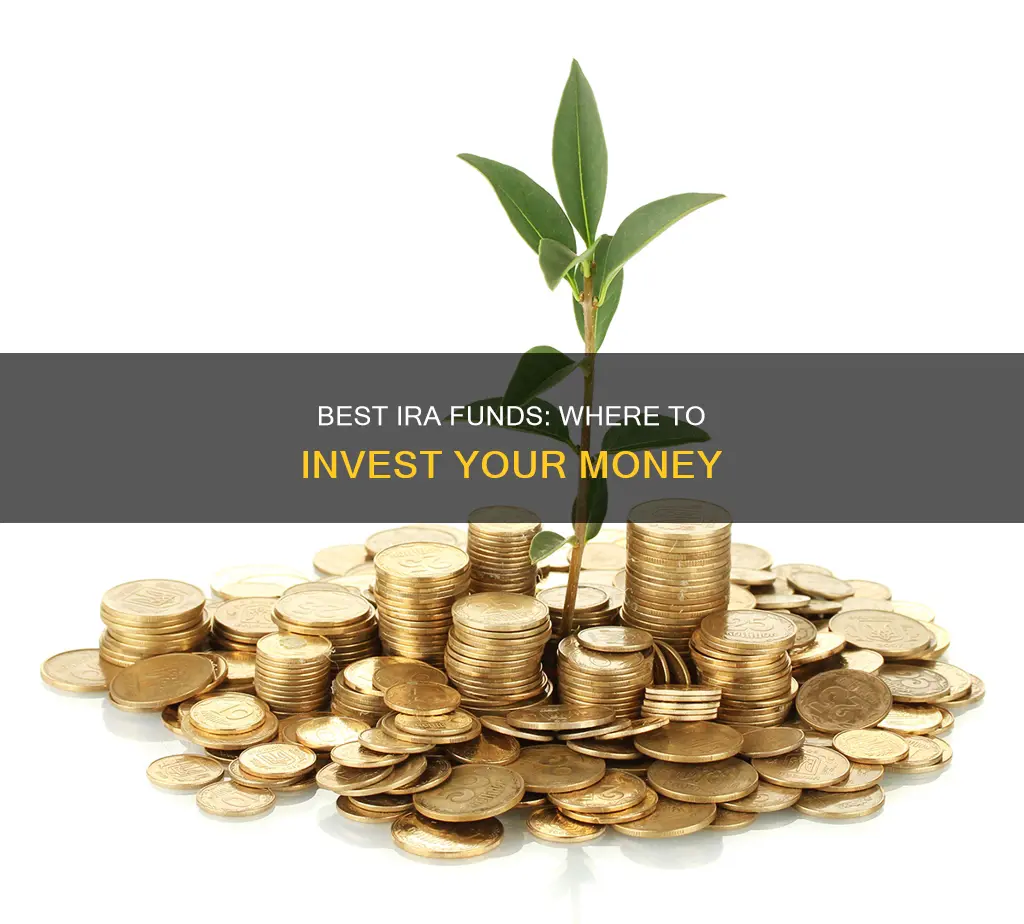
When it comes to investing in an IRA, there are a few key things to keep in mind. Firstly, it's important to understand the difference between a traditional IRA and a Roth IRA. With a traditional IRA, you can lower your tax bill by contributing pre-tax income, but your withdrawals during retirement will be taxed. On the other hand, a Roth IRA allows you to contribute after-tax income, and all withdrawals during retirement are tax-free.
When choosing investments for your IRA, it's crucial to consider your risk tolerance and time horizon. Generally, stocks are considered riskier but offer higher potential returns, while bonds are relatively safe but may not perform as well over the long term. Mutual funds and exchange-traded funds (ETFs) are also popular options for IRA investors as they provide diversification and better results over the long term.
Some of the best investments for your IRA include dividend stock funds, Nasdaq-100 index funds, S&P 500 index funds, value stock funds, and real estate investment trusts (REITs). It's also important to avoid highly speculative investments and focus on those with a strong, long-term track record.
When choosing a broker or robo-advisor for your IRA, look for providers that offer a wide range of investment options, low fees, and strong customer support. Some of the top IRA accounts to consider include Fidelity Investments, Schwab Intelligent Portfolios, Charles Schwab, and Wealthfront.
| Characteristics | Values |
|---|---|
| Best IRA accounts for hands-on investors | Charles Schwab, Interactive Brokers IBKR Lite, J.P. Morgan Self-Directed Investing, Robinhood IRA, E*TRADE IRA, Vanguard, Fidelity IRA, Merrill Edge |
| Best IRA accounts for hands-off investors | Betterment IRA, Vanguard Digital Advisor, SoFi Automated Investing, Wealthfront IRA, Ellevest, Fidelity Go |
| Best funds to hold in a Roth IRA | Vanguard Wellesley Income Fund Investor Shares (VWINX), Vanguard Total Stock Market Index Fund Admiral Shares (VTSAX), Fidelity Blue Chip Growth Fund (FBGRX), Schwab U.S. REIT ETF (SCHH), Avantis Moderate Allocation ETF (AVMA), iShares Bitcoin Trust ETF (IBIT), SPDR Bloomberg High Yield Bond ETF (JNK) |
| Best Roth IRA investments | S&P 500 index funds, Dividend stock funds, Value stock funds, Nasdaq-100 index funds, Real estate investment trusts (REITs), Target-date funds, Small-cap stock funds, Bond funds |
What You'll Learn

Best IRA funds for hands-on investors
If you're a hands-on investor looking to pick and choose your own investments, opening an IRA with an online broker is a good option. Here are some of the best IRA accounts for hands-on investors:
- Charles Schwab: Schwab offers thousands of mutual funds with no transaction fees, commission-free trades, and quick customer service. It also provides extensive research tools and a large selection of investment options, including stocks, bonds, funds, and CDs.
- Interactive Brokers: Interactive Brokers offers commission-free stock trading, a large selection of mutual funds, and a well-featured platform. While the website can be difficult to navigate, it provides high-quality execution and a wide range of investment choices.
- J.P. Morgan Self-Directed Investing: This platform is ideal for beginners, offering commission-free trades, an easy-to-use platform, and access to in-person customer support at Chase branches. However, it may not be suitable for advanced investors as it lacks certain tools and investment options.
- Vanguard: Vanguard is known for its low-cost mutual funds and is a good choice for passive investors. While it has reduced trading commissions to zero, it offers a more basic trading platform and limited research and data tools.
- Robinhood: Robinhood offers a 1% match on contributions, which is uncommon among IRA providers. It provides commission-free trading, a streamlined interface, and investment recommendations for IRA portfolios. However, it does not offer mutual funds or individual bonds.
- E-Trade: E-Trade offers commission-free trading of stocks and ETFs, as well as a large selection of mutual funds. It provides third-party research, high-quality retirement planning tools, and a strong mobile platform.
- Firstrade: Firstrade is popular among traders due to its commission-free trading of stocks, ETFs, and options. It offers thousands of no-transaction-fee mutual funds and supports various types of IRA accounts, including SEP and SIMPLE IRAs.
When choosing an IRA, hands-on investors should consider factors such as investment selection, fees, customer support, and educational resources. It is also important to evaluate your financial goals, timeline, and risk tolerance to determine the best investment strategy for your needs.
DSP Blackrock Micro Cap Fund: A Guide to Investing
You may want to see also

Best IRA funds for hands-off investors
If you're looking for the best IRA funds to invest in as a hands-off investor, here are some of the top options to consider:
Betterment IRA
Betterment IRA is a great choice for hands-off investors as it offers a simple and user-friendly platform for automated IRA management. The standard service charges a competitive annual fee of 0.25% of your assets under management, with a $10 minimum balance investment requirement. You can easily adjust your risk profile and investment strategies, and they also offer alternative portfolios for income or socially responsible investing. For accounts over $100,000, you get unlimited access to financial advisors, or you can pay for consultations à la carte.
Vanguard Digital Advisor
Vanguard Digital Advisor is a basic robo-advisor that builds portfolios from Vanguard's low-cost ETFs. Their portfolios generally hold only four ETFs, providing sufficient diversification without overcomplicating things. While they don't offer access to financial advisors, you can upgrade to their Vanguard Personal Advisor Services once your account reaches $50,000. This makes Vanguard a good choice for hands-off investors who want a simple and low-cost option.
SoFi Automated Investing
SoFi Automated Investing stands out by offering free unlimited access to certified financial planners. They build portfolios using their own proprietary ETFs, which currently have waived expense ratios. However, keep in mind that these funds hold fewer assets, which may raise liquidity concerns. SoFi is a good option if you want hands-off investing with the benefit of financial planning guidance.
Wealthfront
Wealthfront is a top-rated robo-advisor that offers a sophisticated goal-based planner and a fully-featured cash management account. They provide automatic rebalancing and tax-loss harvesting for no extra charge. Their management fee is reasonable at 0.25% per year. Wealthfront is a good choice for hands-off investors seeking a blend of automated investment portfolios and innovative digital tools.
Fidelity Go
Fidelity Go is another robo-advisor option with no fee for accounts under $25,000 and a 0.35% fee for accounts over that threshold. They use Fidelity funds that don't charge expense ratios, so you avoid additional fund fees. As a Fidelity customer, you also get access to their extensive educational resources and 24/7 customer service. Fidelity Go is a good choice for hands-off investors looking for a low-cost, professionally managed portfolio.
Investment Trust vs Fund: What's the Difference?
You may want to see also

Best IRA funds for different risk tolerances
When choosing the best IRA funds to invest in, it's important to consider your risk tolerance. Here are some options for different risk tolerances:
Low-Risk Tolerance:
If you have a low-risk tolerance, you may want to consider investing in a broad-based, passively managed U.S. stock index fund. These funds aim to replicate the performance of the U.S. equity market and provide diversification across different sectors. Additionally, you can invest in U.S. bond index funds, which offer stable and secure sources of income with lower returns. By combining these two types of funds, you can achieve a balanced portfolio with reduced risk.
Medium-Risk Tolerance:
If you have a medium-risk tolerance, you can consider adding a global or international stock index fund to your portfolio. This will provide you with exposure to non-U.S. stocks and further diversify your investments. You can also explore investing in small-cap and mid-cap stocks, which may exhibit higher volatility but potentially higher returns as well.
High-Risk Tolerance:
If you have a high-risk tolerance and are pursuing greater total returns, you can consider reducing your allocation to bonds or even eliminating them from your portfolio. You may also want to explore investing in emerging market economies, such as China, Mexico, or Brazil, which offer higher potential returns but come with higher volatility.
Low-Risk Tolerance:
- Vanguard Wellesley Income Fund Investor Shares (VWINX)
- Vanguard Total Stock Market Index Fund Admiral Shares (VTSAX)
- Fidelity Blue Chip Growth Fund (FBGRX)
Medium-Risk Tolerance:
- Schwab U.S. REIT ETF (SCHH)
- Avantis Moderate Allocation ETF (AVMA)
- IShares Bitcoin Trust ETF (IBIT)
High-Risk Tolerance:
- SPDR Bloomberg High Yield Bond ETF (JNK)
- Nasdaq-100 index funds
- Small-cap stock funds
Mutual of America Funds: Worthy Investment or Risky Business?
You may want to see also

Best IRA funds for different time horizons
When choosing the best IRA funds to invest in, it's important to consider your time horizon, or how long you plan to invest for. Here are some of the best IRA funds for different time horizons:
Short-Term Horizon:
If you're investing with a short-term horizon, you may want to consider less risky options that can provide stable returns. Here are some options:
- Bond funds: These tend to be less risky than stocks and can generate stable returns. Look for core bond funds that hold highly-rated bonds from companies likely to meet their debt obligations.
- Money market funds: These funds invest in low-risk, highly liquid securities such as short-term government or corporate debt. They aim to provide stable returns with minimal risk.
- Certificates of Deposit (CDs): Offered by banks, CDs are low-risk investments that guarantee a rate of return if you leave your money invested for a specific period.
Medium-Term Horizon:
For a medium-term horizon, you can consider a mix of stocks and bonds to balance risk and return potential. Here are some options:
- S&P 500 index funds: These funds track the Standard & Poor's 500 index, providing diversification across hundreds of America's top companies. They have historically performed well, with average annual returns of about 10%.
- Dividend stock funds: These funds invest in companies that pay regular dividends, often in mature industries with stable cash flow. The dividends are tax-free in a Roth IRA and can be reinvested to boost returns.
- Target-date funds: These funds automatically adjust your asset allocation based on your target retirement date, moving from riskier stocks to safer bonds as you approach retirement.
Long-Term Horizon:
With a long-term horizon, you can focus more on growth and consider options that may have higher risk but also higher return potential. Here are some options:
- Growth stock funds: These funds invest in companies with strong growth potential, typically in newer industries or innovative sectors. While they carry more risk, they can provide higher returns over the long term.
- Sector-specific funds: If you believe in the growth of a particular sector, such as technology or healthcare, you can consider sector-specific funds that focus their investments in that area.
- International or emerging market funds: Investing in international or emerging markets can provide diversification and exposure to global economic growth. These funds tend to be riskier but may offer higher returns.
Remember, when choosing IRA funds, it's important to consider your risk tolerance, investment goals, and time horizon. Diversification is also key to managing risk and maximizing returns. It's always recommended to consult with a financial advisor to determine the best investment strategy for your specific situation.
Invest Wisely: Nifty Index Fund SIP Strategies
You may want to see also

Best IRA funds for different tax efficiencies
When it comes to choosing the best IRA funds for different tax efficiencies, there are a few key considerations to keep in mind. Here are four to six paragraphs outlining some of the best options:
Tax-Efficient Investments
Tax-efficient investing involves choosing the right types of accounts and investments to minimize taxes. This strategy is particularly beneficial for those in a higher tax bracket. There are two main types of investment accounts: taxable and tax-advantaged. Taxable accounts, such as brokerage accounts, offer more flexibility but have tax implications depending on how long the asset is held. On the other hand, tax-advantaged accounts like traditional IRAs and Roth IRAs provide tax benefits, either upfront or by allowing tax-free growth and withdrawals.
Taxable vs. Tax-Advantaged Accounts
Taxable accounts are generally better suited for investments that lose less earnings to taxes, such as individual stocks held for at least a year and tax-managed stock funds. Tax-advantaged accounts, on the other hand, are ideal for investments that tend to lose more of their returns to taxes, including individual stocks held for less than a year and actively managed stock funds. By utilizing both types of accounts and implementing an "asset location" strategy, investors can optimize their tax efficiency.
Roth IRAs for Tax-Free Growth
Roth IRAs are a type of tax-advantaged account that offers tax-free growth and withdrawals under certain conditions. Contributions to Roth IRAs are made with after-tax dollars, but the funds grow tax-free. Additionally, if the account has been open for at least five years and the account holder is 59 1/2 years old or meets other exemption criteria, withdrawals can be made without paying taxes or penalties. This makes Roth IRAs an attractive option for long-term growth without the drag of taxes. However, there are income thresholds that restrict eligibility to ensure the benefits are targeted toward the middle class.
Best Funds for Roth IRAs
When choosing funds to hold in a Roth IRA, it's important to consider the impact of taxes on investment returns. While a fund may have strong historical performance, taxes on distributions and the sale of shares can significantly reduce the net annualized return. Some recommended funds for a Roth IRA include the Vanguard Wellesley Income Fund Investor Shares (VWINX), Vanguard Total Stock Market Index Fund Admiral Shares (VTSAX), Fidelity Blue Chip Growth Fund (FBGRX), and Schwab U.S. REIT ETF (SCHH). These funds offer a mix of growth potential and tax efficiency, making them well-suited for the tax advantages of a Roth IRA.
Best IRA Funds for Hands-On Investors
For hands-on investors who want to actively pick and choose their investments, opening an IRA at an online broker can be a good option. Some of the best IRA accounts for hands-on investors include Charles Schwab, Interactive Brokers, Fidelity, and E*TRADE. These brokers offer a wide range of low-cost investment options, including index funds and exchange-traded funds (ETFs), as well as robust retirement planning tools and customer support.
Best IRA Funds for Hands-Off Investors
For investors who prefer a more hands-off approach and want help building and managing their IRA investments, robo-advisors can be a great choice. Some of the best IRA accounts for hands-off investors include Betterment, Vanguard Digital Advisor, SoFi Automated Investing, and Wealthfront. These robo-advisors offer a variety of investment options, robust goal-based tools, and access to financial advisors, all while providing automated portfolio management and low fees.
Lump Sum Mutual Fund Investing: Strategies for Success
You may want to see also
Frequently asked questions
Some of the best IRA funds to invest in include Vanguard Wellesley Income Fund Investor Shares (VWINX), Vanguard Total Stock Market Index Fund Admiral Shares (VTSAX), Fidelity Blue Chip Growth Fund (FBGRX), and Schwab U.S. REIT ETF (SCHH).
A Roth IRA allows you to grow your money tax-free and then withdraw it without paying taxes in retirement. It offers tax-free growth and withdrawals, making it a powerful vehicle for long-term growth.
A traditional IRA allows you to contribute pre-tax income and receive a tax break, while a Roth IRA involves contributing after-tax income with no immediate tax benefit. Withdrawals during retirement from a traditional IRA will be taxed, while withdrawals from a Roth IRA are tax-free.
Some of the best IRA accounts to open include Fidelity Investments, Schwab Intelligent Portfolios, Vanguard, and Betterment. These providers offer a range of investment options and have strong reputations in the industry.
You can open an IRA account by selecting a brokerage or robo-advisor, providing personal and financial details, and connecting your bank to fund the account. The process is typically straightforward and can be completed online within 15 minutes.







